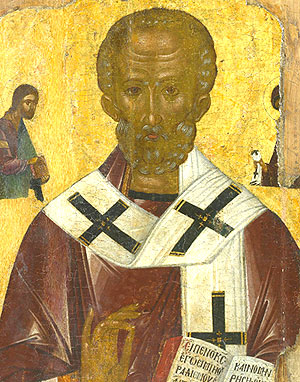Life of St Nicholas the Wonderworker
Commemorated May 9/27, December 6/19
'The truth of things hath revealed thee to thy flock as a rule of faith, an icon of meekness, and a teacher of temperance; for this cause, thou hast achieved the heights by humility, riches by poverty. O Father and Hierarch Nicholas, intercede with Christ God that our souls be saved.'
So reads the troparion of St Nicholas, hierarch of the Church of Myra in Lycia (now Demra in Turkey), known as 'wonderworker' and 'father' throughout the Christian world. He is beloved in the Orthodox Church, and indeed far beyond, for his kindness, almsgiving and aid, meted out both during his earthly life and after. As one of the multitude of English lives of the saint joyously proclaims, 'he is one of the best known and best loved saints of all time.' And in another: 'The name of the great saint of God, the hierarch and wonderworker Nicholas, a speedy helper and suppliant for all hastening to him, is famed in every corner of the earth, in many lands and among many peoples. In Russia there are a multitude of cathedrals, monasteries and churches consecrated in his name. There is, perhaps, not a single city without a church dedicated to his honour.'
Childhood and early life
St Nicholas was born (c. 270) in the the region of Lycia (southern Asia Minor), in the city of Patara. His parents, Theophanes and Nonna, were both pious Christians, and being childless until his arrival, consecrated Nicholas to God at his birth (the name Nicholas meaning 'Conqueror of nations'). His birth considered by both an answer to their prayer, and especially the prayer issued during Nonna's illness, his mother was said to have been healed immediately after giving birth. Nicholas would always remember his parents' love and devotion to God, and in his later years promised to come to the aid of those who remembered them in their prayers.
Various traditions recount signs of Nicholas' future glory as 'wonderworker' (Gr. thaumatourgos), apparent already in his earliest childhood. One recalls that as an infant in the baptismal font, Nicholas stood on his feet for three hours in honour of the Trinity. Another proclaims him a childhood faster, not accepting milk from his mother until after the conclusion of evening prayers on Wednesdays and Fridays.
His later life revealed that Nicholas had from a young age been absorbed in the study of the Church's sacred scriptures. He thrived on reading divine texts, and earned a reputation as a devoted youth who often would not leave the church, reading the sacred texts late into the night.
Such activity soon came to the attention of the local bishop, Nicholas' uncle (his father's brother), also called Nicholas. Seeing his nephew's fervour for the Christian life, this elder Bishop Nicholas of Patara tonsured him reader, and later ordained him priest. At Fr Nicholas' ordination, the elder Bishop Nicholas remarked:
'I see, brethren, a new sun rising above the earth and manifesting in himself a gracious consolation for the afflicted. Blessed is the flock that will be worthy to have him as its pastor, because this one will shepherd well the souls of those who have gone astray, will nourish them on the pasturage of piety, and will be a merciful helper in misfortune and tribulation.'
The newly-ordained Fr Nicholas' special charge as assistant to the bishop of Patara was the instruction of the faithful—a unique and uncommon role, given his young age.
The ministry of Fr Nicholas
Nicholas approached his duties as priest and teacher of the faith with the same fervour his uncle had witnessed in him during his childhood. Despite his youthfulness, many of the faithful considered him an elder, and his ability to respond to questions of the faith in love and wisdom earned him the deep respect of those in the city. He was noted in particular for the fervency of his prayer and kind-hearted nature, and the attention to charitable work that characterised his priestly ministry. Following the injunction of Christ, Fr Nicholas sold his possessions and, following his parents deaths a few years after his ordination, distributed his inheritance to the poor and afflicted, who would often seek him out for assistance...
Continue Reading at pravoslavie.ru

No comments:
Post a Comment